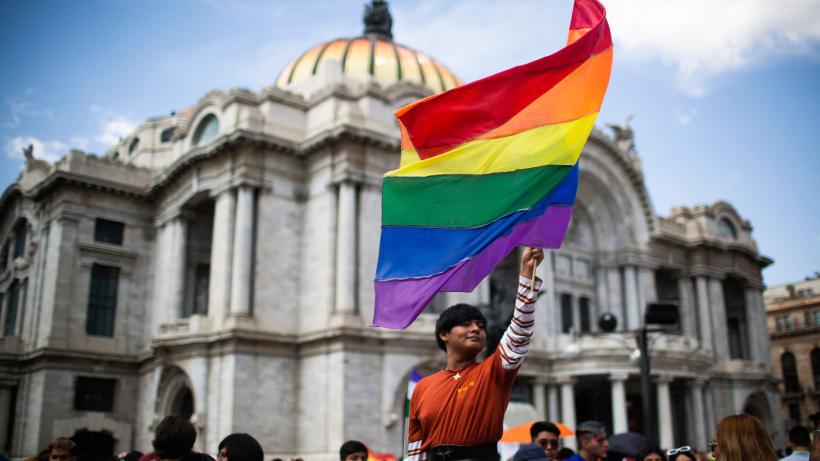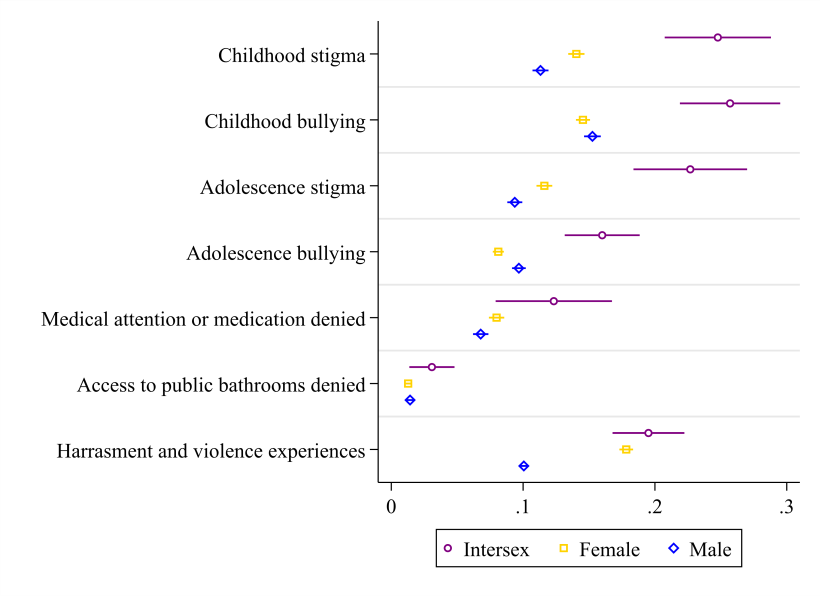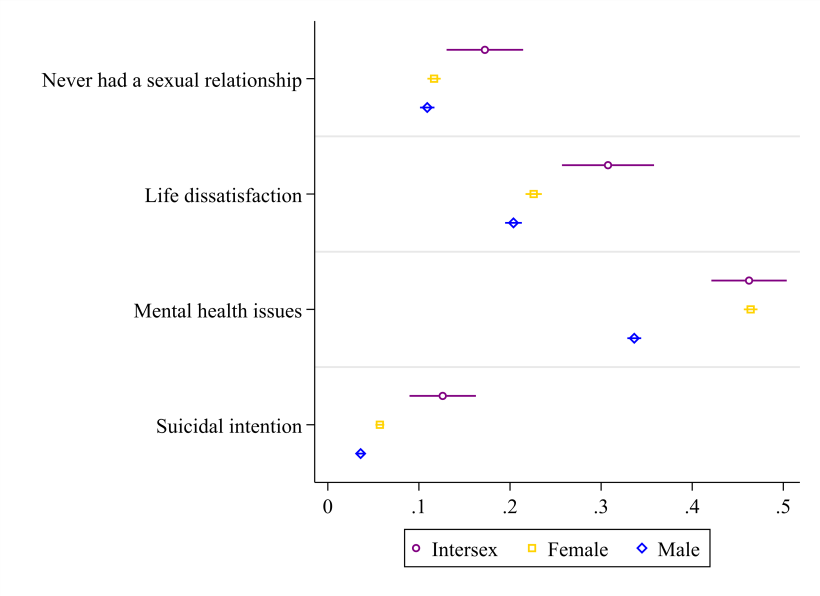
Socioeconomic and health outcomes of intersex people in Mexico
A nationally representative dataset from Mexico reveals that intersex people face discrimination in access to health and labour markets, and have lower wellbeing. This study also prompts the need for more detailed surveys whose analysis can feed into inclusive policymaking to improve the life quality of intersex and other LGBTQI+ populations.
The reality of intersex people confronts doctors, policymakers, and bureaucrats with the existence of a diversity that goes beyond the binary idea of two biological sexes (male and female). These sex variations have been recognised since ancient history, reflected in epic figures such as Hermaphroditus in Greek mythology or Ardhanarishvara in Hinduism. However, today those born with sex characteristics - including variations in genitals, hormones, chromosomes, or internal anatomy - that do not conform to typical biological male or female bodies face several challenges ranging from invisibility to discrimination and non-consensual medical interventions to “correct” these variations, often resulting in irreversible damage such as infertility and psychological stress.
While LGBTQI+ policies and inequalities have received growing attention – including increasing protection for transgender individuals (individuals whose current gender does not match their sex assigned at birth) - intersex issues remain largely hidden, and intersex identity is not usually recorded in population surveys or health records.
In the first ever study to use a large nationally representative survey, we document substantial negative outcomes for intersex individuals. We use a nationally representative survey in Mexico and find that approximately 1.6% of individuals aged 15 to 64 are intersex, in line with previous estimates of 1.7% in the literature. We then document the key challenges faced by intersex individuals throughout their life - such as higher rates of bullying, stigmatisation, harassment, and violence - affecting their wellbeing and socioeconomic outcomes compared to non-intersex (endosex) men and women.
Policy strides in Mexico
Mexico has recently made significant strides in advancing LGBTQI+ rights. For instance, in 2024 the Mexican Senate passed a bill banning conversion therapy nationwide, a harmful pseudoscientific practice that attempts to change someone’s sexual orientation or gender identity. Same-sex marriage is now legal throughout the entire country, following a series of state-level approvals culminating in Tamaulipas’ legalisation in 2022. Furthermore, Mexico has introduced an “X” gender marker on passports for those who do not identify as solely male or female.
At the federal level, Mexico has also implemented a protocol to promote non-discriminatory access to healthcare for LGBTQI+ individuals. Additionally, some local movements and LGBTQI+ advocacy efforts have gradually improved awareness. Organisations like Brújula Intersexual, a voluntary organisation for intersex people, play a vital role in raising awareness and advocating for the human rights and bodily autonomy of intersex people in Mexico and across Latin America. Despite these advancements, specific protections for intersex individuals remain insufficient.
Challenges in access to health and labour markets
We use data from the National Survey on Sexual and Gender Diversity (ENDISEG) in Mexico, the first nationally representative survey conducted by a national statistics office in a developing country with the objective of focusing on the LGBTQI+ population. Our final sample includes around 35,000 respondents aged 15-64, with more than 600 individuals who reported being born with any variations in their body related to their sex.
Intersex individuals face significantly higher rates of stigmatisation and harassment compared to their endosex counterparts, both in childhood and adolescence (Figure 1). These adverse early experiences become a foundation for ongoing discrimination and harassment in adulthood: for instance, intersex people are more likely to experience denial of medical care and access to public restrooms.
Figure 1: Experiences of stigmatisation and harassment among male, female, and intersex individuals

Intersex individuals face substantial barriers in forming intimate relationships, and they report higher levels of life dissatisfaction (Figure 2). Mental health issues are notably more prevalent among intersex people, including higher rates of insomnia, depression, and suicidal ideation, likely linked to stigmatising and traumatic experiences from childhood.
In terms of education and the labour market, intersex individuals achieve lower educational levels and face toxic and challenging work environments. Indeed, although the labour force participation rate of intersex people is higher than that of endosex women, it is lower than that of endosex men. Intersex individuals also face greater exclusion and harassment in the workplace, negatively affecting their wellbeing and job satisfaction.
Figure 2: Wellbeing among male, female, and intersex individuals

The need for inclusive data and policies
These findings are policy-relevant and timely as governments, international and civil society organisations are increasingly working towards addressing human rights violations and discrimination faced by intersex and LGBTQI+ individuals.
Key policy strides include the importance of legal recognition and protection, which can be achieved by implementing non-discriminatory laws and banning harmful practices such as non-consensual medical interventions in babies and infants.
Comprehensive data collection is an essential component of effective policy. Nationally representative surveys, like those conducted in Mexico, are necessary to gather accurate data on intersex and LGBTQI+ populations and inform targeted interventions. Analysing the data over time can yield more nuanced research that can feed into inclusive and equitable policymaking where no one gets left behind.
As countries around the world celebrate Pride in June and reflect on the challenges faced by LGBTQI+ communities, this IGC blog presents ways in which research can be more inclusive and argues why it’s important.

